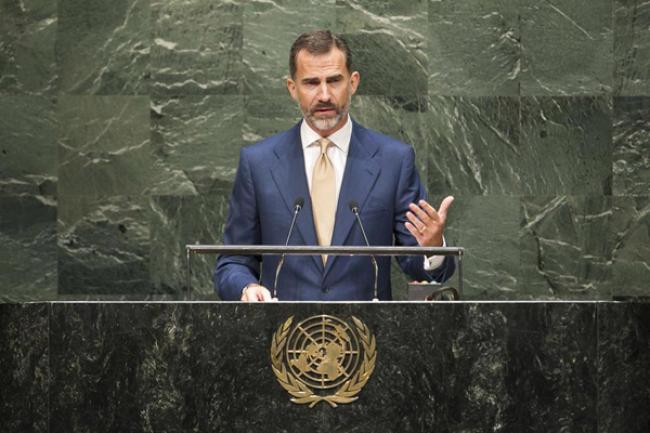25 Sep 2014

Speaking first, King Felipe VI of Spain pledged his continent’s generous contributions to other regions of the world and his own country’s unconditional support for UN values.
“I can assure you that the international community, represented on Wednesday in this General Assembly, can continue to count on Spain's support and its active participation in the unwavering protection of the values and interests of a humanity in peace, evermore prosperous and just,” he told the leaders of 193 nations on the opening day of the 69th General Debate.
“Spain upholds a United Nations that is not only stronger but above all, more united: more united against fanaticism, intolerance and barbarism. More united in fighting against poverty, hunger and marginalization.
More united so that education and health reach all. More united, President, in firmly defending the dignity of all human beings.”
Noting Spain’s transformation over nearly 40 years from dictatorship to a democracy based on the rule of law, protecting all citizens in its political, geographic, cultural and linguistic diversity, the king said the world can always count on his country’s firm commitment to promoting and defending democratic values.
Turning to the Middle East where some societies “suffer the scourge of an intolerable barbarism, a criminal and atrocious violence that threatens all societies and our human civilization,” he stressed that the world can count on Spain to confront, all together and respecting international law, those who aim to destroy with intolerance, violence or sectarianism the values and principles that underlie our United Nations.”
Armenian President Serzh Sargsyan stressed the UN’s “indispensable role” in setting new long-term goals for sustainable development worldwide.
“I strongly believe that through the new ‘Post-2015’ development agenda we will continue our efforts seeking solutions and responding to challenges of global nature stemming from the Millennium Development Goals,” he said referring to the new roadmap that is to fill out and replace the eight MDGs set for the first 15 years of the new millennium.
Armenia, General Debate, 69th Session
Sargsyan devoted most of his speech to issues of specific Armenian concern, including a pressing call to Turkey to “demonstrate the courage and face its own history by recognizing the Armenian Genocide, thus relieving the next generations of this heavy burden of the past.
“Alas instead, we continue to hear ambiguous and ulterior messages, in which the victim and the slaughterer are equalized, and the history is falsified,” he said referring to the deaths of hundreds of thousands of Armenian nearly 100 years ago at the time of the First World War and noting the threats now facing tens of thousands of Armenians at the hands of Islamist extremists in Syria.
He also blamed the “bellicose declarations and various threats” by neighbouring Azerbaijan for a failure to reach a settlement in the Nagorno Karabakh conflict, saying it had flouted UN Security Council resolutions by continuing military hostilities.
Citing the conflicts in Ukraine and Syria and Iraq which violated core UN rules and values, President Sauli Niinisto of Finland said the grim state of international relations should be seen as “a call to redouble our diplomatic efforts.”
“We must act with determination and we must act now,” he declared. “Unfortunately, the UN Security Council has not been able to uphold its responsibilities neither in Ukraine nor in Syria. We need to reform the Security Council. Finland supports the efforts to restrict the use of veto.”
Threats or actual vetoes, the sole prerogative of the five permanent members – China, France, Russia, the United Kingdom and United States – have blocked Council action on both issues.
He noted that the General Assembly, whose resolution lack the legally binding force of the Council’s adopted a resolution on Ukraine, but said it should have been “even stronger, condemning Russia's actions” and charting a way towards restoring peace.
“De-escalation in Ukraine cannot happen without Russia's active steps,” he warned. “Russia should control its border and prevent the flow of arms and fighters, and thereby contribute to stabilization of the situation in Eastern Ukraine. There can be only a political solution to the crisis.”
Likewise the Syrian crisis can only be solved by political means and he pledged Finland’s continuing support for the efforts of UN Special Envoy for Syria Staffan de Mistura to resolve the issue.
King Felipe VI of Spain, addresses the general debate of the sixty-ninth session of the General Assembly. UN Photo/Cia Pak